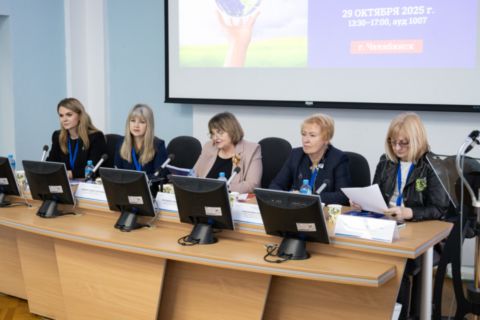A scientific and methodological roundtable discussion entitled "Regional Information Agenda on Ecology and Media Effects" was held at South Ural State University. Organized by the SUSU Institute of Media, Social Sciences and Humanities, the event brought together leading experts in ecology, media communications, and academic research. Research on this topic is being carried out with financial support from the Russian Science Foundation (Project No. 23-18-20090, https://rscf.ru/project/23-18-20090/), and is led by I.V. Sibiriakov.
The event's partners include the Ministry of Ecology of the Chelyabinsk Region, Chelyabinsk Civic Chamber, Union of Journalists of the Chelyabinsk Region, and leading regional media. Academic partners, including St. Petersburg State University, St. Petersburg Electrotechnical University "LETI", Chelyabinsk State University, and the Chelyabinsk State Institute of Culture, made significant contributions to the round table.
The discussion was moderated by Professor Vera Achkasova, Doctor of Sciences (Politics), Head of the Department of Public Relations in Politics and Public Administration at St. Petersburg State University, and Professor Liudmila Shesterkina, Doctor of Sciences (Philology), Head of the Department of Journalism, Advertising, and Public Relations at the Institute of Media, Social Sciences and Humanities at South Ural State University.
"The topic of our project, developed by a distinguished research team, is "A Study of the Impact of Environmental Media and Social Media Content and Media Effects on Young Audiences Living in an Environmentally Risky Region". The primary objective was to monitor how environmental topics are presented in the media and the city online communities in an industrial region. From 2023 to 2025, we analysed materials from 29 media outlets and 14 city online communities in the Chelyabinsk and Sverdlovsk regions. In total, we collected over 14000 media texts. The central focus of the study is to examine young people's conscious and unconscious reactions to this media content using neuromarketing technologies based on the analysis of psychophysiological and biometric indicators," noted Professor Lidiya Lobodenko, Doctor of Sciences (Philology).
Participants shared their experiences in developing an environmental information agenda: Anastasiia Lapo, Chairperson of the Chelyabinsk Public Chamber, highlighted the environmental issues in the context of youth policy; Liudmila Babenkova, Head of the Press Service of the Chelyabinsk Region Ministry of Ecology, spoke about the specifics of working on this topic in local media; and Alevtina Nikitina, Executive Secretary of the Union of Journalists of the Chelyabinsk Region, focused on the specifics of environmental journalism in the South Ural region.
"The environmental agenda is currently at the core of numerous grant projects, and specialists from a wide range of fields, including media and public administration, are working on it. This area is particularly important due to its strategic significance. Since 2024, a presidential decree on our country's national development goals has been in effect. Among such goals, the environmental well-being occupies a particularly significant place. It should also be considered in terms of how this category is perceived by society," Anastasiia Lapo emphasized.
Also among the speakers at the round table were heads of the leading regional media outlets: Evgeniia Dmitrenko, Director of the Yuzhny Ural State Television and Radio Broadcasting Company; Aleksandr Fairuzov, Editor-in-Chief of the Chelyabinsk Today online publication; and Dariia Godunova, Deputy Director of AO "Obl-TV" television company. At the meeting, they discussed the specifics of environmental journalism in the South Ural region and the media practices for environmental education.
"Environmental issues occupy a crucial place in public policy, and as a state-owned media outlet, we are systematically working to inform our audiences, develop environmental culture, environmental awareness, and environmental thinking. Communication with the audience, education, dialogue, and upbringing are the basis and foundation of journalism's social function. Since the environmental agenda is one of the key areas of our country's socioeconomic development and remains a profound, multifaceted, and wide-ranging topic, media outlets and socially oriented journalists face a significant challenge to ensure high-quality coverage," noted Evgeniia Dmitrenko.
In addition, Larisa Sharakhina, Candidate of Sciences (Philology), Associate Professor, Head of the Department of Public Relations at LETI, spoke on the topic of integrating corporate environmental projects into the media agenda, as did Lidiya Lobodenko, Doctor of Sciences (Philology), Professor.
The roundtable discussion on "Regional Information Agenda on Ecology and Media Effects" marked an important step in developing collaboration between scientists and practitioners, and the results of the discussion will serve as the basis for future research and projects aimed at improving the environmental situation in the region. Research on this topic is being carried out with financial support from the Russian Science Foundation (Project No. 23-18-20090, https://rscf.ru/project/23-18-20090/) under the supervision of I.V. Sibiriakov.




